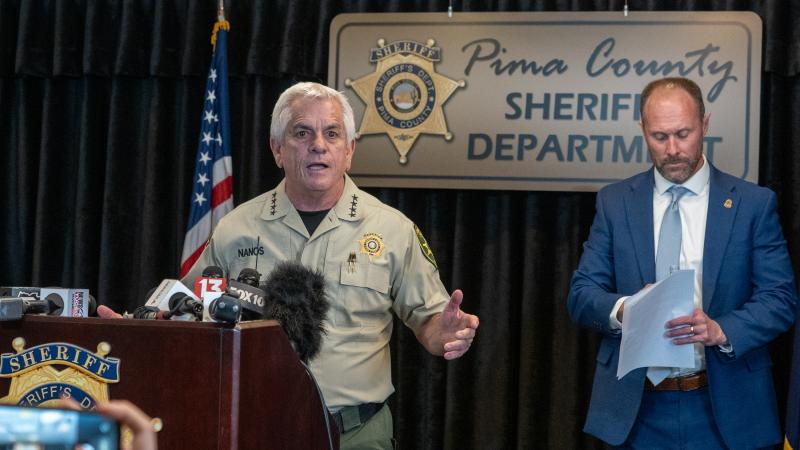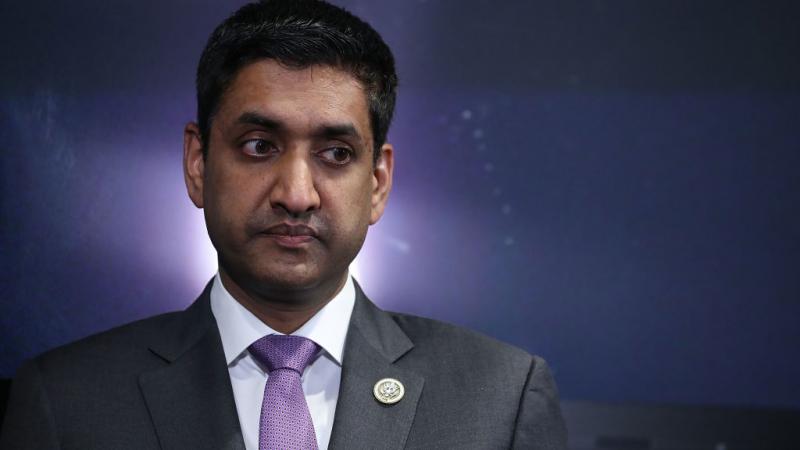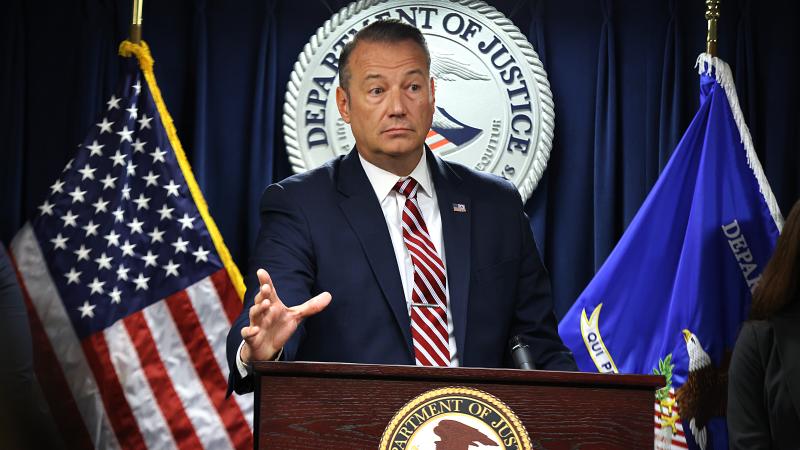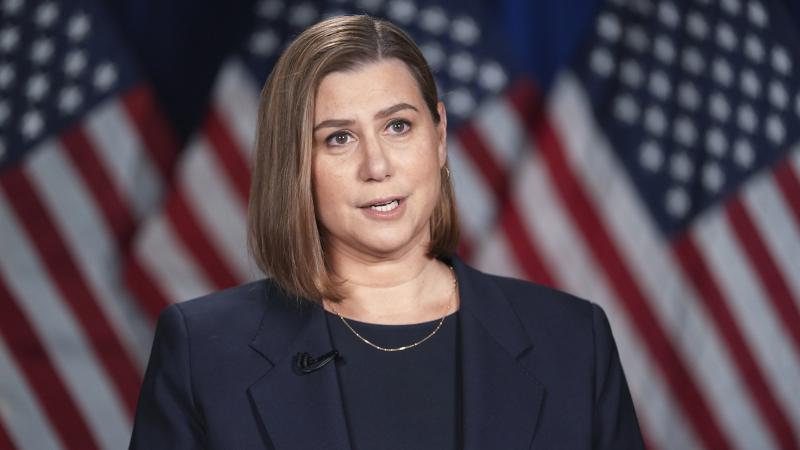Not just Big Oil - awards in climate lawsuits could make major industries targets, says legal expert
Former Interior Sec. Gale Norton said the ability for firms to enrich themselves opens up the potential for a broader range of lawsuits to be filed against any large emitters, including utility companies operating power plants, as well as steel, plastics, cement and ammonia producers.
A horde of lawsuits targeting oil companies over climate change could, if successful, be expanded to any industry that produces large amounts of carbon dioxide emissions, according to Gale Norton, former attorney general of Colorado who served as Secretary of the Interior under George W. Bush.
Norton, who currently serves on the board of Liberty Energy, told Just the News that unlike other environmental lawsuits, the climate lawsuits have an “opportunistic model” because of the financial awards that the law firms filing these suits will take a piece of.
“Now you have not just ideological or environmental reasons for opposing the oil companies, but also the financial reason. Trial attorneys are not going to be limited by a view of what’s good policy as they’re filing lawsuits. They’re going to look at who has deep pockets or who is someone that I feel my law firm could prevail against,” Norton said.
Opportunities for enrichment
Norton explained in an article in Law360 environmental litigation of the past several decades has been administrative. The legal challenges came with whether regulatory standards were followed. Success in court might mean that a construction permit for an industrial facility was revoked and the project halted, but there wasn’t a lot of financial reward to be had.
Now with more than two dozen states and local governments seeking billion-dollar payouts from energy companies for alleged climate damages using state-level public nuisance law and consumer fraud statutes, the nature of the suits has changed. While the contingency fees on these cases are largely confidential, Norton wrote, the claims against approximately a dozen defendants are huge. This is attracting mass tort litigation trial attorneys, Norton warns.
As attorney general for Colorado, Norton took part in the Master Settlement Agreement against tobacco companies. In an interview, Norton said that states were, for the most part, represented by contingency lawyers.
“I did not think that was appropriate. My staff represented Colorado. We did not hire outside counsel. It really caused me to become familiar with this situation when you have attorneys who are using the power of the state to go after big ticket awards and thereby enrich themselves,” Norton said.
Should the climate lawsuits find success, Norton said, the ability for firms to enrich themselves is going to open up the potential for a broader range of lawsuits to be filed against any large emitters. This would include utility companies operating power plants, as well as steel, plastics, cement and ammonia producers.
New York Attorney General Letitia James filed a lawsuit against beef giant JBS Foods in February. While it’s not a lawsuit seeking damages for climate change, it involves accusations of fraud against the company for the company’s net-zero commitments, which the suit argues are unrealistic and lacking in practical plans. The climate lawsuits against oil companies also allege oil companies have deceived the public because they didn’t warn consumers about the potential for carbon dioxide emissions to impact the climate, and anti-fossil fuel activists have compared “Big Oil” to “Big Tobacco.” Norton said there is a big difference between the two.
“Obviously, tobacco companies misrepresented the health effects of their products for years. A lot of their advertising is what caused people to smoke. With oil and gas, it's not because of Exxon's advertising that people are deciding to drive cars or heat their homes. There's a very major difference in terms of economic significance of tobacco compared to the entire energy industry,” Norton said.
Others have also pointed out that the claim that oil companies knew about climate change and tried to deceive people is exaggerating how much the companies’ researchers knew about the impacts of emissions, and mischaracterizing their internal debate as an attempt to deceive.
Sabine Hossenfelder, a physicist who describes herself as “not a fan of the fossil fuel industry,” has criticized this view as “nonsense.” The oil companies’ researchers knew as little as any scientists, and it was all part of the public record, Hossenfelder explained in a post on X. Rob Bradley, founder of the Institute for Energy Research, provides a six-part refutation of the accusations on his blog “Master Resource,” arguing in greater detail the points Hossenfelder made.
Attribution science
The House Committee on Oversight and Accountability last year launched an investigation into one firm that is representing the plaintiffs in these lawsuits, Sher Edling. The investigation sought more information on the “wealthy liberals” who are funding the lawsuits “aimed at bankrupting oil and gas companies.”
In their response, the firm explained that bankrupting the companies wouldn’t be in their interest, since the companies wouldn’t be able to pay the settlements. The firm also argued that their clients are not seeking damages for all the effects of climate change, but only the ones allegedly caused by the companies’ alleged deception.
Part of determining those damages will be a field of science that was developed specifically for these lawsuits called attribution science. Climate reporters have also latched onto the field in reports on studies finding the degree to which climate change supposedly contributed to specific weather events. For example, the BBC claimed last summer that a heatwave in North America was “35 times more likely” due to carbon dioxide emissions. Bloomberg claimed a drought in the Amazon was 30 times more likely thanks to carbon dioxide emissions.
Dr. Matt Wielicki, former assistant professor in the Department of Geological Sciences at the University of Alabama, argues on his “Irrational Fear” Substack that the main motivation behind these lawsuits is money.
Wielicki told Just the News that attribution science contradicts the Intergovernmental Panel on Climate Change, a U.N. consortium of the world’s leading climate scientists, which states in its AR6 report, “Scientists cannot answer directly whether a particular event was caused by climate change, as extremes do occur naturally, and any specific weather and climate event is the result of a complex mix of human and natural factors.”
Wielicki said these attribution studies, which are rushed out immediately after an event without any peer review, are a lot like the pandemic health requirements that people stand six feet apart, which Dr. Anthony Fauci, former chief medical advisor to the president, testified in a January House hearing had no scientific basis. These figures that climate change made certain natural disasters more likely, Wielicki said, are just arbitrary numbers.
“They have some models. They tweet some numbers. They get 500 times more expected rainfall from Helene than without climate change, and then the mainstream media publishes it. There's no peer review, there's no actual investigation of the science. It's just propaganda,” Wielicki said.
Fragmented rulings
The Supreme Court is currently reviewing a challenge to one climate suit filed by Honolulu. Hawaii’s Supreme Court had allowed the lawsuit to go forward, and the case is now with the U.S. Supreme Court, which has asked the Department of Justice to weigh in. Norton wrote in her Law360 article that, should the high court fail to step in, it would create “a web of fragmented and contradictory rulings will result, constraining the abilities of courts, legislative bodies and federal agencies to address sensible climate-related challenges.”
Norton told Just the News that should the cases wind their way through state courts and ultimately come down on the side of the plaintiffs, the costs of the settlements will be borne by energy consumers, which will be everyone. More than that, she said it would ultimately undermine good environmental action.
“To be workable, environmental policy needs to take into account jobs and people's economic well being, as well as the environmental results. Having a hodgepodge of different court rulings in different states is not going to provide a good regulatory framework if you're going to deal with emerging issues like climate change. New technologies are one of the best ways of addressing those issues,” Norton said.
She thinks it’s likely the Supreme Court will take up the case.
“This issue goes so far in counteracting our entire regulatory structure for environmental issues, of usurping the role of Congress and state legislatures in making decisions like this. I think there's a good chance the U.S. Supreme Court will recognize the importance of limiting the role of courts,” she said.
The Facts Inside Our Reporter's Notebook
Links
- horde of lawsuits targeting oil companies
- board of Liberty Energy
- explained in an article in Law360
- more than two dozen states and local governments
- Master Settlement Agreement
- filed a lawsuit against beef giant JBS Foods
- anti-fossil fuel activists have compared
- explained in a post on X
- Master Resource
- launched an investigation
- Sher Edling
- In their response
- attribution science
- 35 times more likely
- drought in the Amazon was 30 times more likely
- Irrational Fear
- AR6 report
- had no scientific basis
- currently reviewing a challenge
- Department of Justice to weigh in












